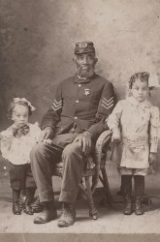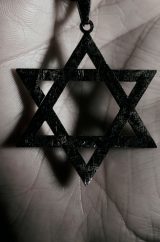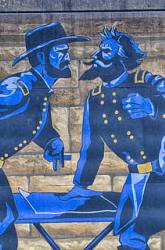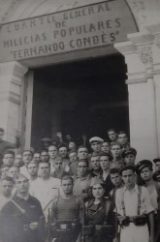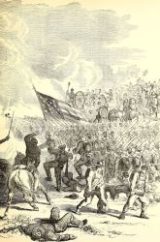Best Non-Fiction Civil War Books
| Photo | Title | Rating | Length | Buy |
|---|---|---|---|---|

|
This Hallowed Ground | 9.76/10 | 448 Pages | Check Price On Amazon |

|
This Republic of Suffering | 9.14/10 | 346 Pages | Check Price On Amazon |

|
Team of Rivals | 9.66/10 | 916 Pages | Check Price On Amazon |

|
A Diary from Dixie | 9.12/10 | 480 Pages | Check Price On Amazon |

|
Sickles at Gettysburg | 9.32/10 | 504 Pages | Check Price On Amazon |
Standing Out
The subject of the civil war is so vast that for a book to stand out it would have to focus on a specific aspect in order to have a reader turn the pages. The best non-fiction civil war books do exactly that, covering subjects such as the war from only one side, or the human suffering in the war, a personal diary, or a biography.
This Hallowed Ground by Bruce Catton and Lewis Gannett

 Union Perspective
Union Perspective
This Hallowed Ground by Bruce Catton and Lewis Gannett is a very factual and academic work on the story of the American Civil War from the perspective of the Unions. He meticulously covers ground from the initial period of unrest right through to beyond Appomattox. Catton writes movingly and with depth and explores issues in a profound way as he looks for the real intentions and purposes of this war.
Prior Knowledge
The book is suitable for a reader without prior knowledge as it covers the history in a very clear way, covering the battles from the viewpoint of the Union, and he portraits major figures such as Sherman and Grant. He also manages to add the humanitarian side showing the difficult unbearable lives and living conditions of the soldiers on the ground.
Strategy and Politics
The Hallowed Ground is both comprehensive with good detail, and readers say if any one book should be read, it must be this as it is one of the best non-fiction civil war books. It is excellent on war strategy and history and politics, and weaker on the societal and humanitarian side; nevertheless, it still covers enough of the latter for it to be categorized as an excellent comprehensive work.
This Republic of Suffering by Drew Gilpin Faust
 Death from All Angles
Death from All Angles
There is a whole plethora of literature on the American Civil War, but Faust manages to bring something new to its study: and that is the subject of death, and the dying, and everything associated with it. This Republic of Suffering by Drew Gilpin Faust focuses on this most avoided subject, and she tackles death from all angles in the light of the Civil War.
“Practicalities”
Faust discusses the practicalities of death, the difficulties of identifying the dead, the burials, the embalming, how undertaking began to grow as a profession, and how military graves began to develop. Outside the war zones, she shows the effects of war other than dead soldiers: the difficulties of displacement and disease, the emotional toll on the people and the economic difficulties.
She describes those fatalities outside the ‘glory’ of the battlefield that were as a result of the war, such as falling trees and disease and suicide and straying rockets and so forth. She also charts the emerging thought and practice associated with the end of slavery.
Not a Historical Account
She does not write a historical account as such of the American Civil War—rather, she draws the reader into feeling for the dead and dying in the American Civil War. She dwells in places most dread to go, such as the removal of the bodies, which amounted to thousands of bodies scattered across the battlefields of America, which had to be found and labelled and buried, which was nothing but a momentous and gruesome task.
She talks about the dead bodies, the collection of their personal artefacts, the identification of the dead, the burials, the creation of national cemeteries and registering the dead.
Blood-Chilling
Faust uses the writings of the personal experiences of soldiers and their families, and block quotes many other sources; however, she weaves in and out her own train of thought and text with much ease and flow. Interestingly the quotes prove how high the standards of English were back then, as common soldiers wrote beautiful prose today most are incapable of—as one soldier writes about a wounded sergeant:
‘A bullet had clipped a groove in his skull, above the temple; from this the brain protruded in bosses, dropping off in flakes and strings. I had not previously known one could get on, even in this unsatisfactory fashion, with so little brain.’
Realization of the Consequences
This Republic of Suffering is a highly acclaimed and award-winning book. It is no surprise that Faust, a renown academic and historian and one-time president of Harvard University, brings something quite unique and serious to literature on the American Civil War.
Realization of the consequence of war and its results: the bleeding bodies, the smells emanating from them, the vile ugliness of it all, the futility of it all; and a correct attitude of empathy and sympathy and feeling, for the bleeding bodies piled up for death for nothing, and the broken hearts of every loved one associated with every broken corpse.
Team of Rivals by Doris Kearns Goodwin
 Masterpiece Biography
Masterpiece Biography
Team of Rivals by Doris Kearns Goodwin is a masterpiece biography of Abraham Lincoln. Goodwin charts his life from being an unknown attorney to the competition with his rivals and to his great rise to power and prominence as president.
Goodwin shows what it is about Lincoln that made him legendary: it wasn’t so much his powerful mind and strength but actually his empathic nature, his ability to understand others and their motives and their needs, and his ability to get people to work together and resolve their differences.
Amazing Qualities
He had an amazing and rare combination of excellent qualities, which he mobilized to full effect to take the Union to victory and end slavery. As well as quite rightly talk about Lincoln like some majestic angelic figure, Goodwin also does a good job proving that American politics hasn’t changed much…. As she shows the bitter rivalry and jealousy of Lincolns rivals, Seward, Chase, Bates.
Rivalry in the Whitehouse
She shows the rivalry in the Whitehouse, all the politics around Lincoln, and meanwhile Lincoln always coming through as a hero in real life. He was a master of men, and proved himself the master of a land.
A Diary From Dixie by Mary Boykin Chesnut
 Wife of a Confederate General
Wife of a Confederate General
One of the best books of non-fiction books on the war must be A Diary From Dixie. A Diary From Dixie by Mary Chesnut is the diary of the wife of a Confederate general called General James Chesnut.
Fascinating Account
She writes a fascinating account of all the years of the war and she describes the trials and difficulties people suffered especially around her own circle of military and politicians.
Mary is from a prominent family and is expected to behave in a certain way as mistress of a plantation; however, luckily for us the readers, she writes in her diary her true feelings about her position in life as a southern belle during the Civil War.
No Pretending
She seems to write effortlessly and she writes as she lives, with ease and without force or pretension and with honesty. From her we catch a real glimpse into how the owners treated the slaves, and how the slaves were with their owners. Her world though slowly crumbles and darkens and her style more heavy as victory beckons for the Union and defeat looms for the Confederates.
No Substance?
The book is criticized for the author being an arrogant lazy upper class woman with no substance. Even if this is true, it is fascinating to get a look from the other side, the side of those who owned the slaves and had to end their entire, over privileged lifestyle.
However, the subject is more nuanced than she can only be all bad, as she owned slaves, since many owners, including her, kept the slaves after emancipation for the remaining twenty years of her life, simply because they had nowhere else to go.
Sickles at Gettysburg by James A. Hessler

 General Dan Sickles
General Dan Sickles
Sickles at Gettysburg by James A. Hessler details the life of one of the most famous protagonists of the American Civil War, General Dan Sickles. Sickles was a larger than life character, known for his charms with women and for his big involvement in politics.
He murdered his first wife’s lover, then managed to get away with it claiming insanity, and then reunited with his wife. So before the American Civil War even began Sickles was infamous. Sickle was brave and courageous and likeable and he enjoyed the backing of Abraham Lincoln, while being promoted many times.
Climax of the Book
Gettysburg is the climax of the book and the author portrays his involvement in it and his involvement in the political realm after the war. The book generally details much about the battles of the American Civil War and it is said one must have a keen interest in it in order to see the pages through. However, the fascinating character of Sickles is enough to carry the reader through any detailed accounts of battles.
In total, he led a very full life, in all its aspects, and his life and decisions he made are still debated today. This is a most fascinating account as one of the best non-fiction books on the civil war.
Reader’s Interest
Reading a non-fiction book about history of the civil war can be tortuous if the reader must read just battle after battle and date after date. Converting the facts into a biography of a fantastical character, or writing about human suffering, or writing about only one side of a battle is surely the way to hold the reader’s interest, as these four books do.
Michael Englert
Michael is a graduate of cultural studies and history. He enjoys a good bottle of wine and (surprise, surprise) reading. As a small-town librarian, he is currently relishing the silence and peaceful atmosphere that is prevailing.
